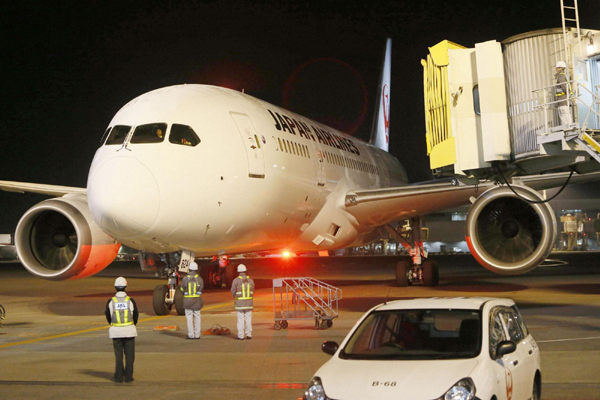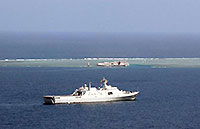Boeing 787 is safe: top engineer
(Agencies) Updated: 2013-01-10 11:40Analysts said they did not think regulators would ground the 49 Dreamliner jets currently in service due to this week's incidents, but some expected days or weeks to pass before firm details about the mishaps emerge - making it difficult to assess the severity of the problem, and the cost to fix them.
"It's clear through the conversation (from Sinnett) that it appeared to be manufacturing as opposed to design issues," said Jason Gursky, an analyst at Citigroup in San Francisco. "The fact that we've seen a multitude of small issues crop up and are not seeing the same issue time and time again would support that view."
 |
|
Japan Airlines' (JAL) Boeing Co's 787 plane which encountered the mishap of a fuel leak arrives at New Tokyo international airport in Narita, east of Tokyo, in this photo taken by Kyodo, Jan 9, 2013. [Photo/Agencies] |
Further detail from regulators are likely to take more time. In July, regulators took three days to decide whether to launch an investigation of a General Electric engine that failed on a 787, and another week passed before they provided details.
"We'd expect a similar timeline here," said Deutsche Bank analysts Myles Walton and Amit Mehrotra, in a note to clients Wednesday.
Boeing declined to discuss any aspect of the investigation into the battery fire. Analysts said the company still faces an image problem over the build quality of its marquee plane.
"There's no doubt in my mind that on the engineering side they are doing the right thing as far as dealing with these issues," said John Goglia, a former National Transportation Safety Board member and mechanic.
"They need to really reach out strongly with information to the press corps to make sure they understand exactly what happened and exactly what they are doing about it."
Boeing shares closed up 3.5 percent Wednesday, after losing more than 5 percent earlier this week.
"TEETHING PROBLEMS"
Of this week's incidents, the battery fire is of most concern. Lithium-ion batteries are heavily scrutinized by those who use them - not just airlines, but increasingly automakers as well.
"We cool our batteries. We put them through tests like you wouldn't believe," General Motors Chief Executive Dan Akerson said during a roundtable event Wednesday.
Shares of Japan's GS Yuasa Corp, which makes batteries for the 787, fell sharply for a second day on Wednesday.
Before Wednesday, Boeing had said little about the problems, though some of its most critical customers, like the CEO of Qatar Airways, have come to its defense.
Qatar Airways, the largest customer of the Dreamliner in the Middle East with an order for up to 60 of the aircraft, currently has five 787 jets. CEO Akbar al-Baker said the airline had no other issues since noting an electrical problem on one of its jets in December.
"Of course there will be teething problems from time to time, but this is foreseen with any new aircraft program," Al-Baker told reporters at an event in Doha on Wednesday.
Baker said he had no plans at the moment to cancel any plane orders with Boeing. "When we have to start grounding planes, then it becomes an issue and then they (Boeing) have to get their check book out," he said.







